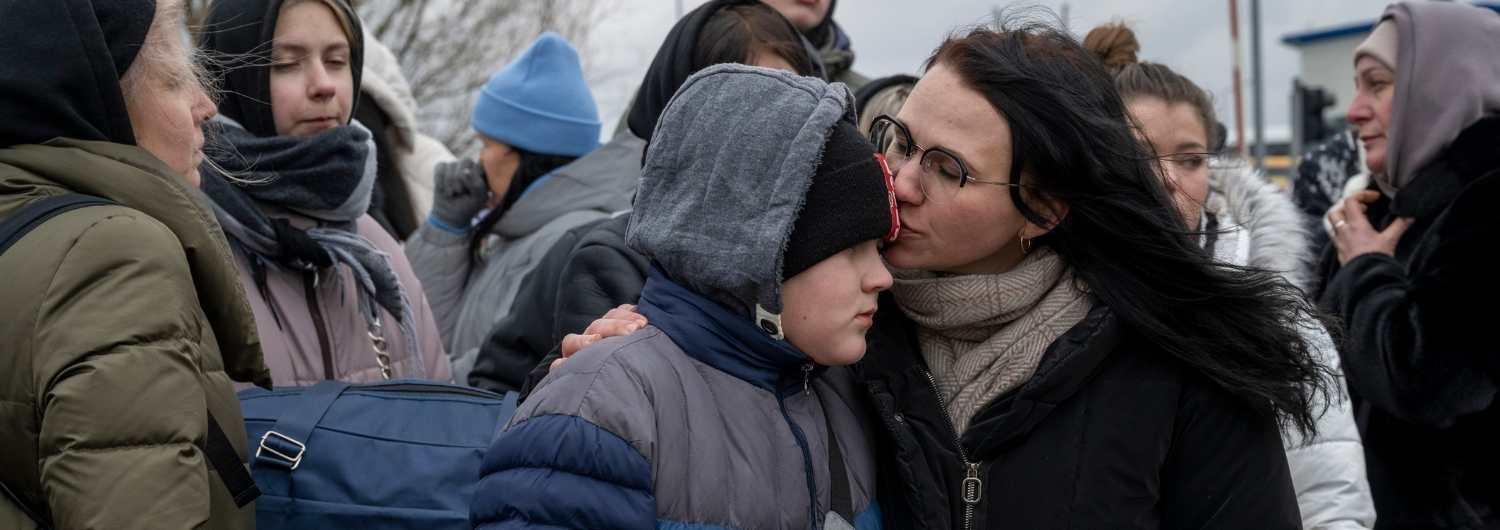

Ana's story: escaping conflict in Ukraine
Our former colleague Ana* shares her story of life in Kyiv during the first air strikes, how she managed to get out of the city and how she supports the humanitarian response in Moldova.
Living in Kyiv was like living in London. It was a beautiful, lively city and there was always something going on. Life in Kyiv was wonderful (I can't believe I'm saying "was"). No one expected this to happen. Until the last minute, people went about their daily lives.
The morning after the first air strike
The night before the first air strike was like any other night. My family and I went to bed expecting to wake up at the usual time and have breakfast together.
We woke up around 4 a.m. to the sound of explosions. They were close enough to shake the house and strong enough to get us out of bed immediately with one thought in our minds: the war had begun.
I knew that in the next few days my family would need supplies, so I left at 9am to get food and water. I walked to the city centre because there were no Ubers, taxis or public transport. Within hours of the first attack, food had begun to run out and there was no more bread on the shelves. The city that morning was not the busy Kyiv I knew. Large military trucks were already whizzing through the empty streets where there would be traffic on any other day of the week.
There were queues everywhere, outside petrol stations, supermarkets, banks and even pharmacies, as people knew they had to stock up.
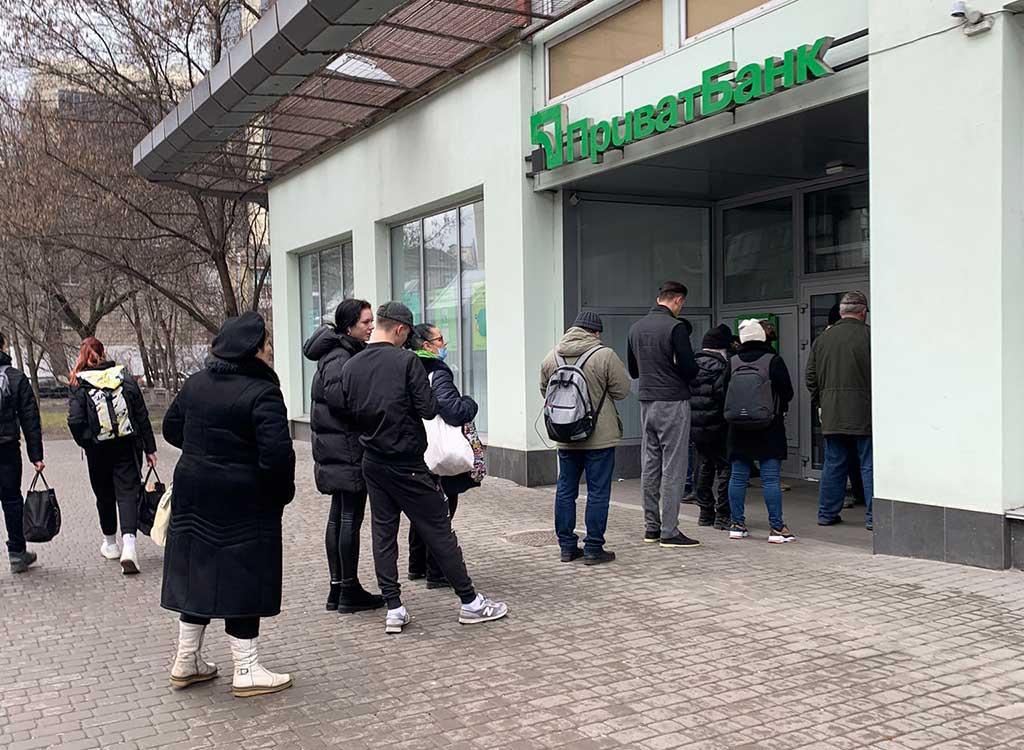
Queues at banks as people try to withdraw cash the morning after the first air strike.
Life underground
In the first few days, the main concern was who had underground shelters and who did not.
The population was so unprepared. No one knew where the underground bunkers were, so everyone headed for the metro stations.
There was a pattern to the explosions: it all started around 4 am. On the second day I counted 30 missiles before I stopped counting. We realised that we had to get to a suitable shelter. Our house is a home, not a bomb shelter, so the roof would collapse if hit.
When we arrived at the shelter it was full of people. People had been camping since the night before and everyone had their own food and water in their own personal spaces. Everyone was very quiet and very scared. You could hear the children crying and saying they needed to go to the toilet, but the mothers said no because there are no underground toilets. People were too scared to go out.
Grocery shops are running out of supplies
From the first day of the invasion, the whole country went underground. My friends who are still in Ukraine say they have not received new supplies for more than ten days. Things have sold out and some shops have just closed.
Because it is so cold in Ukraine, they are often very good at pickling and canning food, so some people now live only on canned fruit and vegetables. The old Ukrainian women, the babushkas, are the pros at this!
In the southern parts of the country, people have not had enough food and drinking water for days, it's a disaster.
In Kyiv there is still clean water and electricity, but in the south there is nothing. Not a thing.
Anyone who had the money to leave, left in the first few days. Many doctors also left. Now even those who cannot afford to go to another country have no choice but to leave.

Empty bread shelves in Kyiv a few hours after the first air strike.
Escape from Kyiv
Seven days after the conflict began, I was able to leave Kyiv in a UN convoy. A privilege, but also a risk. There was an official convoy of 20 UN cars with about 90 more following unofficially.
There was a lot of fear that day. We knew that evacuation routes were not being respected and that anything could happen at any time. In the medical report the night before our departure, the doctor gave explicit instructions on what to do in case of fractures, excessive bleeding and heavy impacts. Throughout the week, everyone I shared the shelter with had more or less kept their composure, even during the daily air raids. But I could feel how nervous everyone was as they watched the doctor demonstrate how to properly position an unconscious person.
The journey from Kyiv to Chisinau usually takes eight hours, but it took us 19 because we kept receiving information about troops arriving on our route. Although we had UN flags and police escorts, there was no real guarantee of security. But fortunately, due to the security measures, everyone was able to leave the city without any problems.
We passed almost 70 checkpoints. Some even had volunteers handing out food and water even though people did not have much to give. At almost every checkpoint there were between 100 and 300 cars lined up. We passed through easily, but some civilians had to spend hours at each checkpoint.
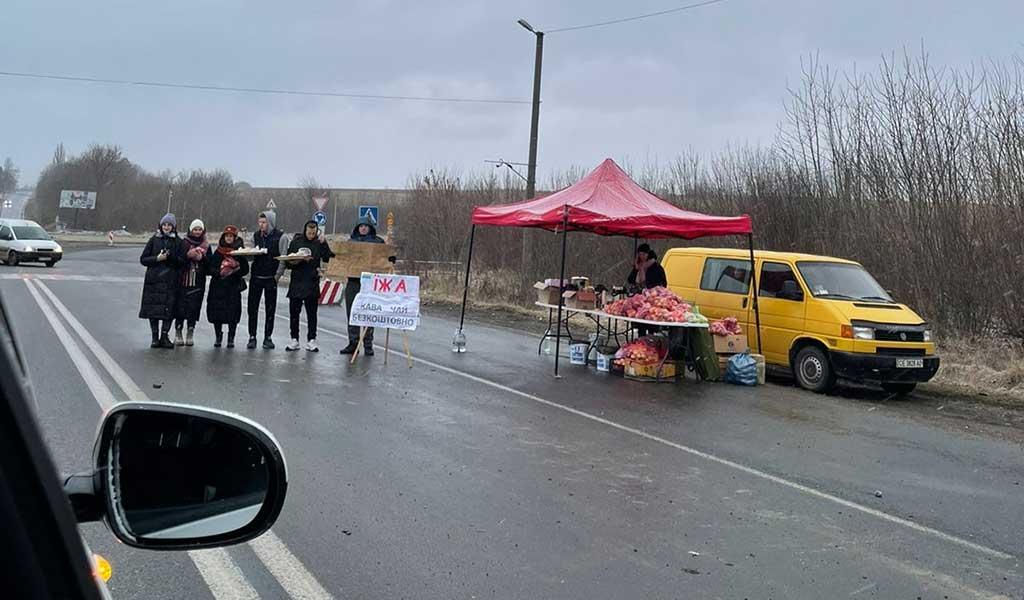
Food delivery at a checkpoint in Ukraine. The sign says "Tea, coffee, free".
Along the roadside, we saw villagers digging trenches so that if a Russian convoy passed by, they could take cover and use their guns to shoot at them.
At one point we stopped to go to the toilet. In the car repair shop near the petrol station, we saw women making Molotov cocktails. Shortly afterwards, at the nearby checkpoint, the anti-aircraft sirens sounded and everyone had to rush back to their cars to leave quickly.
Twenty minutes later we heard the sound of shelling and then discovered that the area had been attacked. The fact that we knew that a place we had just been to had been bombed was terrifying.
The response in Moldova
Since arriving in Moldova's capital, Chisinau, I have been volunteering in the city's two main refugee centres.
Thousands of refugees arrive every day, but about half of this number also leave Moldova, making it a major transit centre at the moment. They are mostly poorer people, who stay in these refugee centres because they cannot afford to pay for accommodation.
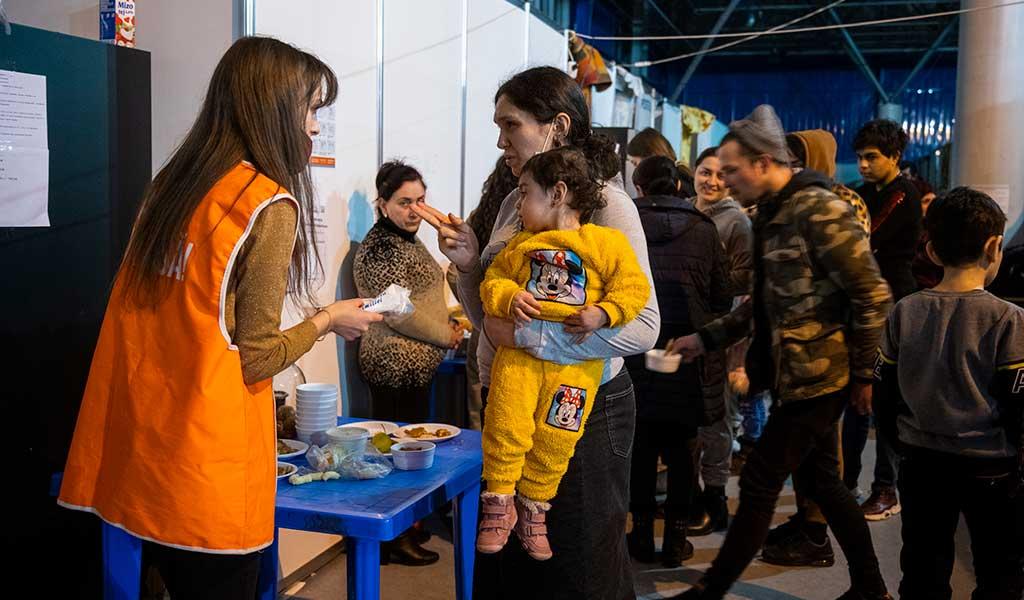
A woman appeals for help at the Moldexpo exhibition centre, currently used to house Ukrainian refugees (Photo: Action Against Hunger/ Gonzalo Höhr).
he Moldexpo exhibition centre used to be a COVID centre. There are 500 beds, places to distribute food and even places for people to keep their pets. I am very impressed by how they have adapted the centre and how they are organising the influx.
The other main centre is a 700-bed sports centre. It is a large stadium with folding beds and some mattresses on the floor.
They have psychiatrists working in the centres to help children with their trauma. They also have buses that go to 44 other centres: schools, music halls, anywhere with heating. The only criterion for being a shelter at the moment is to have a roof and heating.
For most arrivals, cash is the most useful form of support, as the Ukrainian currency, the hryvnia, has depreciated and is worth almost nothing. There are plenty of food and hygiene supplies here in Moldova for people to buy. Ukrainians are a very proud people and it would help their dignity to be able to buy what they need themselves.
It is also a ticking time bomb for COVID outbreaks with the influx of people, but it is the least of their worries. Many children arrive with diarrhoea mainly because they have only been able to eat processed food with a high sugar content, as this is the only type of food available. Hygiene is also difficult to maintain in the crowded metro stations and trains they have recently been on.
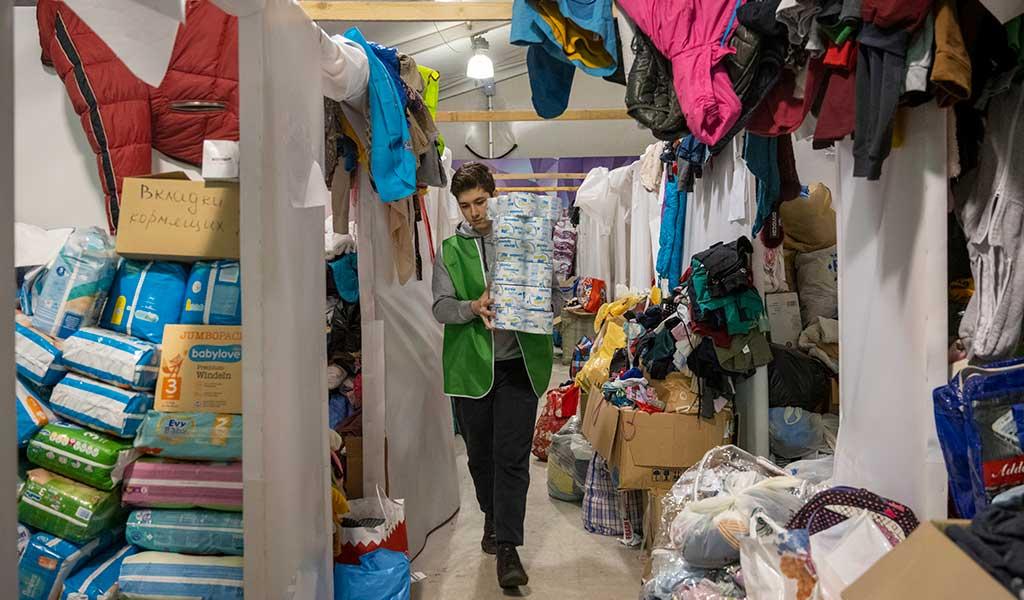
A volunteer with supplies at the Moldexpo exhibition centre, which is currently being used to house Ukrainian refugees (photo: Action Against Hunger/ Gonzalo Höhr)
What happens next
This is really one of those things that I thought would never happen to me. I now have a refugee visa in my passport, only a backpack with my belongings and I have no idea when or if I will be able to return. All Ukrainians at this moment feel this pain tenfold.
Despite being displaced, but in a position to help, my first instinct has been to respond to the crisis in every way possible. I plan to continue my work here in Moldova and also to travel to Romania and Hungary in the coming weeks. Depending on the situation in Ukraine, my priority would be to go back and help provide food and water to the most vulnerable groups. Every day, more and more refugees flee to neighbouring countries. I want to help meet at least their basic needs after suffering such terrible circumstances.
* Names have been changed to protect identities.
